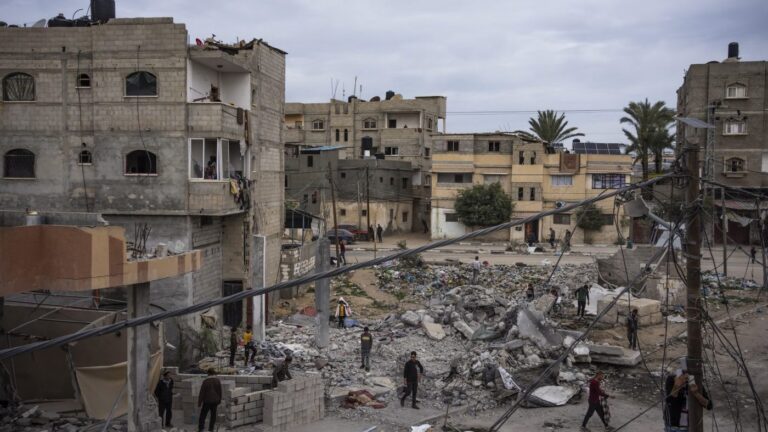Israel and Hamas are slowly making progress towards another cease-fire and hostage-release deal.
Israeli Prime Minister Benjamin Netanyahu rejected a previous cease-fire plan proposed by the Palestinian militant group Hamas to end the war in Gaza on Feb. 7.
Netanyahu referred to the plan as “delusional” as it would have left Hamas in control of the Gaza Strip.
“It will just invite another massacre,” Netanyahu said at a news conference after meeting with Secretary of State Antony Blinken.
A senior Egyptian official said mediators have achieved “relatively significant” progress after meeting on Feb. 13 in Cairo with representatives from Qatar, the U.S. and Israel.
While specific details of the plan have not been revealed, several sources have confirmed a six-week deal is being discussed. However, more work is needed to reach an agreement.
“The key elements of the deal are on the table,” said President Joe Biden, adding, “there are gaps that remain.” He further commented that the U.S. would do “everything possible” to make an agreement happen.
Tensions rose on Feb. 11 after an Israeli airstrike killed several Palestinians in Rafah during a successful hostage rescue.
Israeli military spokesman Rear Adm. Daniel Hagari said special forces broke into an apartment in Rafah early Monday morning and were accompanied by airstrikes on surrounding areas. The hostages, Fernando Simon Marman, 60, and Louis Har, 70, were being guarded by armed Hamas militants.
Marman and Har were abducted from Kibbutz Nir Yitzhak on the morning of Oct. 7 alongside hundreds of others as Hamas-led terrorists from Gaza stormed through Israel.
In footage of the rescue, both men are offered blankets, but they refuse.
“It’s warm. It’s warm in our hearts,” said Har. “What joy, what joy.”
After being rescued, the two men were airlifted to Sheba Medical Center and are reported to be in good condition.
The airstrikes that supported the rescue killed at least 67 Palestinians, including women and children, according to Health Ministry spokesman Ashraf al-Qidra.
“We found ourselves running with our children, from the airstrikes, in every direction,” said Palestinian refugee Mohamed Zoghroub.
Israel has described the city as the last remaining Hamas stronghold in the Gaza Strip territory and signaled that they may begin a ground offensive soon.
Those living in Rafah are attempting to flee ahead of the expected military operation.
“We’ve been living in a state of terror for about a week now,” Anwaar al-Rai, 48, said in an interview with the Washington Post. Rai, who is traveling with her husband and two daughters, has been reaching out to people in western areas of Gaza’s central region. “We urgently need a safe haven,” she said.
Others, however, are tired of running.
“We’re exhausted. Seriously, we’re exhausted,” said Jihan al-Hawajri, who has fled several times from the north down the Gaza Strip. “Israel can do whatever it wants. I’m sitting in my tent. I’ll die in my tent.”
Since the beginning of the war, Israel has made it clear that destroying Hamas’ governing and military capabilities and freeing the remaining hostages are its main goals.
An estimated 1.5 million people are sheltering in Rafah with nowhere else to turn. U.N. officials warn that an attack on the city would be catastrophic.
“Any large-scale military operation among this population can only lead to additional layers of endless tragedy,” Philippe Lazzarini, head of the United Nations Relief and Works Agency, the main organization leading the humanitarian effort, told The Associated Press.
Netanyahu said lasting peace could only be achieved through a “total victory” of Israel against Hamas.
“Without total victory, Iran and its terror proxies – Hamas, Hezbollah, the Houthis and others – will be emboldened to subvert moderate states in the Middle East; they’ll threaten the entire free world,” said Netanyahu. “Only total victory will prevent that. And total victory is within our reach.”




